Deborah J. Ross's Blog, page 137
November 29, 2013
A Season of Light
I love the postings about all the things we're grateful for. Many of them are commonplace, some extraordinary. One of the things I'm grateful for is that I've finally reached the stage -- whether from age or emotional maturity or divine intervention -- when I prefer a simple meal with family and friends to an extravagance of overeating foods that are far too rich for my body.
Hence, this year's festivities. A simple meal with my wonderful younger daughter and her partner: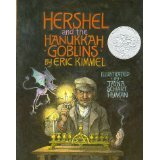 salad with tomatoes from garden (harvested green, then ripened on the counter, but still better than grocery store ones) and avocados from a friend; steelhead since they don't eat poultry or mammals; quinoa pilaf; buttercup squash from our garden; rhubarb crisp (from our garden, harvested last spring and frozen). After dinner, we lit Chanukah candles and enjoyed the traditional reading-aloud of a childhood favorite: Herschel and the Hannukah Goblins by Eric Kimmel (complete with silly goblin voices).
salad with tomatoes from garden (harvested green, then ripened on the counter, but still better than grocery store ones) and avocados from a friend; steelhead since they don't eat poultry or mammals; quinoa pilaf; buttercup squash from our garden; rhubarb crisp (from our garden, harvested last spring and frozen). After dinner, we lit Chanukah candles and enjoyed the traditional reading-aloud of a childhood favorite: Herschel and the Hannukah Goblins by Eric Kimmel (complete with silly goblin voices).
When my daughters were small, I wanted to minimize the commerciality of Chanukah (as distinct from the present-giving orgy of their father's family). So, no presents, but songs and games and books to read aloud. Years later, they confessed to me that they didn't want to imply they didn't like getting presents, but they liked Chanukah better than Christmas. What's important, what endures, is love and laughter, not material goods.
May your days be filled with joy and your nights with glorious light.
Hence, this year's festivities. A simple meal with my wonderful younger daughter and her partner:
 salad with tomatoes from garden (harvested green, then ripened on the counter, but still better than grocery store ones) and avocados from a friend; steelhead since they don't eat poultry or mammals; quinoa pilaf; buttercup squash from our garden; rhubarb crisp (from our garden, harvested last spring and frozen). After dinner, we lit Chanukah candles and enjoyed the traditional reading-aloud of a childhood favorite: Herschel and the Hannukah Goblins by Eric Kimmel (complete with silly goblin voices).
salad with tomatoes from garden (harvested green, then ripened on the counter, but still better than grocery store ones) and avocados from a friend; steelhead since they don't eat poultry or mammals; quinoa pilaf; buttercup squash from our garden; rhubarb crisp (from our garden, harvested last spring and frozen). After dinner, we lit Chanukah candles and enjoyed the traditional reading-aloud of a childhood favorite: Herschel and the Hannukah Goblins by Eric Kimmel (complete with silly goblin voices).When my daughters were small, I wanted to minimize the commerciality of Chanukah (as distinct from the present-giving orgy of their father's family). So, no presents, but songs and games and books to read aloud. Years later, they confessed to me that they didn't want to imply they didn't like getting presents, but they liked Chanukah better than Christmas. What's important, what endures, is love and laughter, not material goods.
May your days be filled with joy and your nights with glorious light.

Published on November 29, 2013 10:42
November 21, 2013
ARCHIVES Northlight: Evolving a Novel
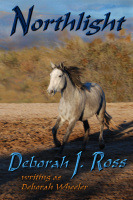 Since Northlight is on sale for $1.00 off at Book View Cafe, here from the archives is some background on how I wrote this book.
Since Northlight is on sale for $1.00 off at Book View Cafe, here from the archives is some background on how I wrote this book.After I submitted Jaydium, which was to become my first published novel, I began work right away on my next project. Or rather, I took a look at all the ideas and characters which were screaming inside my skull to be made into stories and tried to decide which one would cause me the most anguish if I didn't work on it first. High on my list was to rewrite the last novel I'd written before Jaydium. It had received careful attention, not to mention three single-spaced pages of critical feedback, from the editor who would later buy Jaydium.
I felt that if an editor had taken that much time and trouble with the book, there was something of value, something that perhaps I was now a good enough writer to bring out fully.
The book's working title was Weiremaster, and it was based on the world of my very first professional short story, "Imperatrix", which appeared in the debut Sword & Sorceress anthology. Weires are bipedal ape-like creatures, seven-feet tall, fanged, silver-furred, immensely powerful and receptively telepathic. In the world of "Imperatrix," they obey people of imperial blood. For the purposes of that short story, no further explanation was needed.
Now, years later, my world-building had matured. I wanted to know how these creatures had come into a human world, how the control worked, and how the dynastic characteristic had been established. I concocted an adventure which would lead my hero into the world of the Weires and back home again, changed. He would carry me -- and the reader -- along with him, a classical hero-quest.
I began the story as Terricel, a young scholar, received word that the democratically elected ruler of his city had been killed -- shades, no doubt, of my own memories of the Kennedy assassination. "Imperatrix" had portrayed a worthy monarchy, with heavy overtones of The Divine Right of Kings. Now I shifted in my world view to a populist leader. After all kinds of political turmoil, a second main character appeared -- Kardith, a Border Ranger, looking for help in searching for her missing partner, Terricel's sister. And so the action began.
When I sat down to actually write the new version, I realized that the assassination had to happen on the page or not at all. It was simply too pivotal an event to tell second-hand. And twist them as I might, I couldn't seem to make the politics of the city anything but deadly boring. I wrote and rewrote the first 150 pages four or five times, until I was heartily sick of them. And they were still boring. The shift toward democracy had been right in tone but wrong in emphasis. This wasn't in essence a political story.
Then I asked myself, When does the story get interesting? I realized that everything up to the entrance of Kardith was preparatory. She came barging into the city -- and Terricel's staid scholarly life -- and set off the chain of events that made up the backbone of the story. Okay, I said to myself, let's chuck the preliminaries and get right to the good stuff. But what about the assassination, which plays a pivotal role in shaping future events? I moved the assassination in time to shortly after Kardith arrived in the city. And as I wrote about these events, something strange and wonderful happened.
Kardith herself started talking to me.
I'd known she was brazen, obstinate, darkly humorous, an accomplished knife fighter. But as her voice came clearer, I realized that she was telling me a much more powerful and moving story than I ever envisioned. Her courage and the abiding pain of her past ran like a counterpoint through the dramatic action.
You can't turn a story over to someone like Kardith and expect it to come out unchanged. By the time Kardith was done with it, there were no more Imperials and no more Weires. There was, instead, a far different world to be explored, and very human lessons to be learned.
One of the interesting questions that comes up is how much of the author is in the character. This was particularly relevant since Kardith is a knife fighter, and I used techniques from my style of kung fu (san soo, as taught by Jimmy H. Woo) in describing her fighting style. I'd never written a character who was so vivid and yet so different from me. But I never felt that Kardith was me; rather, she was someone I had something in common with. I think a writer needs the sensitivity and imagination to have empathy for the character she creates; there must be some bridge, some understanding, but the character must not be limited to the writer's own experience and taste. It was only logical that a character as colorful and determined as Kardith would shape the story in a new direction.
But the direction was not hers alone. She'd brought along Terricel and had given him a new name, Terris. In the original version, Terricel was a cipher, a place holder whose function was to take the reader along on the adventure. After Kardith was through telling her tale, I was left with a wimpy, Terricel-sized hole in the story.
Terris turned out to be a more complex character than I'd dreamed, just as full of surprises as Kardith was, and more difficult to get a hold on. For one thing, Kardith's focus was intensely personal and emotional, whereas Terris had the ability to see a larger picture, to dream larger dreams. His gifts were those of empathy and imagination. He took Kardith -- and me -- clear across the wilderness to places and times I hadn't imagined existed.
If Kardith was the story's heart, Terris now became its soul. With the two of them as anchors, I could now explore the political aspect of the story without turning it into a recitation of dreary details. The book acquired a new title, Northlight, which then became a metaphor for transformation. But the center of the story remained with these two characters, their dreams and passions, the web of their lives. In order to find that center, I had to be willing to let go of my preconceptions of what the story "was supposed to be" in order to discover what it could become.
Afterword: In the process of bringing out a digital version of Northlight, I refocused the cover image. Judith Tarr was kind enough to allow me the use one of her splendid horses for Karrdith's gray mare.

Published on November 21, 2013 01:00
November 18, 2013
News and notes - November 2013
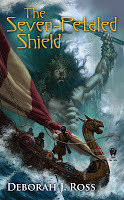 I've been quieter than usual here and I thank you all for keeping the archives nice and warm. A little while ago, I posted various sorts of good news. Here's what's on my plate -- er, my computer -- now.
I've been quieter than usual here and I thank you all for keeping the archives nice and warm. A little while ago, I posted various sorts of good news. Here's what's on my plate -- er, my computer -- now.I'm about to begin editorial revisions to the third book of The Seven-Petaled Shield. It's called The Heir of Khored, and if you've read the first one, that will mean something. If not, you have a treat in store. Heir is a June 2014 release. It's so great to have the volumes come out about 6 months apart. And, I must confess, a bit odd to be plunging into #3 on the eve of the release of #2 (Shannivar).
To "clear the boards for action," as it were, I finished the first, very rough draft of an "Attack Novel." That is, one that so grabbed me that I wanted to write it, even on spec. Depending on how extensive the revisions my editor wants for Heir and when the deadline is, I'm hoping the keep the excitement of this project going, at least long enough to send it out to a beta reader. A beta reader is someone I trust to take a look at the whole shapeless mess and give me an overall reaction. Beta readers are to be treasured and showered with chocolate.
I'm also working on an anthology that I've been keeping silent on until the lineup of stories was complete. Stars of Darkover (to be published by the Marion Zimmer Bradley Literary Works Trust in time for Marion's birthday, June 2014) is just that -- an anthology of stories by "Marion's writers" and "friends of Darkover," superb professional writers all. Once the contracts are done -- very soon now! -- I'll be able to post the Table of Contents. Stay tuned!
And if that isn't enough, I'm putting together a collection of my essays on writing, life, and the care of the creative muse. InkDance: Essays on the Writing Life will come out in January from Book View Cafe.

Published on November 18, 2013 01:00
November 16, 2013
Link: Katharine Kerr's blog series on creating magical systems
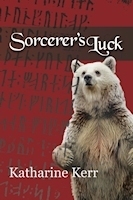 Over on the Book View Cafe blog, Katharine Kerr talks about systems of magic and how shedeveloped the one in her Deverry series. This is the first of a series well worth following, whether you write fantasy or love to read it.
Over on the Book View Cafe blog, Katharine Kerr talks about systems of magic and how shedeveloped the one in her Deverry series. This is the first of a series well worth following, whether you write fantasy or love to read it.She says,
I personally am of the opinion that fantasy magic systems are stronger and more emotionally moving when they have one foot in reality, as it were. Historical magics, whether the disconnected spells and charms of folk magic or the elaborate systems of the elite, address deep human longings and concerns. Wanting to have someone love you, the fear of being harmed, the desire for revenge on an enemy, fear of what the future might bring, desire for riches, and above all, the fear of death — most folk magic revolves around emotions like these. The elaborate systems of Natural Philosophy, the late medieval/early Renaissance magic of the learned, center around the desire to understand the entire universe, to converse with beings other than ourselves, and to use this knowledge for . . . drum roll . . . most of the same reasons as ordinary folk had. Well, the natural philosophers did worry less about love charms.
Strong emotions, strong motivations. In ordinary life, we use the word "magic" to describe many of these experiences, even when we don't ascribe a supernatural element to them. Magic based in strong emotions is more accessible, more understandable, to the reader who has also shared some version of those longings and fears. They also make for great storytelling!

Published on November 16, 2013 10:36
November 11, 2013
November Special Sales
Over at the Book View Cafe ebookstore, Northlight is on special for the month of November for a
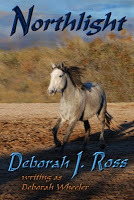
mere $3.99. (And you can read a sample to whet your appetitie!)
She’s a Ranger, a wild and savvy knife-fighter, determined to get help
in finding her partner who’s lost on the treacherous northern border.
He’s a scholar who sees visions, eager to escape the confines of city
life and the shadow of his charismatic mother. With the assassination of
a beloved leader and the city in turmoil, the two have only each other
to turn to. What begins as a rescue mission turns deadly as together
they unravel the secret that lies beneath Laurea’s idyllic surface.
Here's some brag:
“A beautifully constructed fantasy with characters who grow and
mature before the reader’s eyes and who are engagingly human while being
fantastically heroic. Her writing flows and the point of view switches
are interesting and exciting. This book is a keeper.” — Rickey Mallory, Affair de Coeur
“A style and manner reminiscent of McCaffrey’s Crystal Singer series.” – The Bookwatch
“An unusual saga that starts slowly but builds to a startling climax.” — Sherry S. Hoy, Kliatt
“Solid characters and a well-designed world make for good reading.” – Philadelphia Press
“The plot moves briskly from crisis in Laureal to capture by the
Norther barbarians to discovery of the true meaning of the Northlight of
the title, with ample foreshadowing from the mysterious spooky
something in the air of the frontier. And the culmination quite
satisfactorily evokes the sense of wonder.” –Tom Easton, Analog
The audiobook version is here, from Audible, narrated by A. T. Chandler.


mere $3.99. (And you can read a sample to whet your appetitie!)
She’s a Ranger, a wild and savvy knife-fighter, determined to get help
in finding her partner who’s lost on the treacherous northern border.
He’s a scholar who sees visions, eager to escape the confines of city
life and the shadow of his charismatic mother. With the assassination of
a beloved leader and the city in turmoil, the two have only each other
to turn to. What begins as a rescue mission turns deadly as together
they unravel the secret that lies beneath Laurea’s idyllic surface.
Here's some brag:
“A beautifully constructed fantasy with characters who grow and
mature before the reader’s eyes and who are engagingly human while being
fantastically heroic. Her writing flows and the point of view switches
are interesting and exciting. This book is a keeper.” — Rickey Mallory, Affair de Coeur
“A style and manner reminiscent of McCaffrey’s Crystal Singer series.” – The Bookwatch
“An unusual saga that starts slowly but builds to a startling climax.” — Sherry S. Hoy, Kliatt
“Solid characters and a well-designed world make for good reading.” – Philadelphia Press
“The plot moves briskly from crisis in Laureal to capture by the
Norther barbarians to discovery of the true meaning of the Northlight of
the title, with ample foreshadowing from the mysterious spooky
something in the air of the frontier. And the culmination quite
satisfactorily evokes the sense of wonder.” –Tom Easton, Analog
The audiobook version is here, from Audible, narrated by A. T. Chandler.

Published on November 11, 2013 10:30
November 5, 2013
All Sorts of Great News
... some about my work, others just plain delicious. This week's round-up:

The latest Sword and Sorceress, just released, includes my story, "Pearl of Tears." It's a companion piece or reflection of "Pearl of Fire" from S & S XXII. The narrator, and the consequences of her actions, wouldn't leave me alone. The anthology is available in ebook and print editions from the usual places.
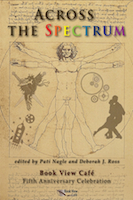
From Book View Cafe, a delicious and awesomely wonderful anthology of "author's favorite" stories (edited by me and Pati Nagle). "From the fantasy and science fiction of our roots to steampunk, romance,
historical and mainstream; from humor to life’s hardest challenges,
across the spectrum from light to dark. Stories by Ursula K. Le Guin,
Vonda N. McIntyre, Marion Zimmer Bradley, and many more." Here's the link to order it or download a sample story. The Table of Contents:
Shapeshifter Finals, by Jeffrey A. Carver
Feef’s House, by Doranna Durgin
Ukaliq and the Great Hunt, by David D. Levine
Parsley, Space, Rosemary, and Time, by Katharine Kerr
Monsoon Day, by Mary Anne Mohanraj
The Fiddler’s Price, by Sarah Zettel
Solstice, by Jennifer Stevenson
Cuckoo, by Madeleine E. Robins
Nine White Horses, by Judith Tarr
Handing on the Goggles, by Brenda W. Clough.
Litany of Hope, by Irene Radford
By the Sea, by Shannon Page
Climbing to the Moon, by Ursula K. Le Guin
The Cornfield, by P.G. Nagle
Ducks, by Katharine Eliska Kimbriel
Short-Timer, by Dave Smeds
Terminal, by Chaz Brenchley
Suraki, by Dave Trowbridge
The Honor of the Ferrocarril, by Sylvia Kelso
Transfusion, by Deborah J. Ross
Survival Skills, by Nancy Jane Moore
Of Mist, and Grass, and Sand, by Vonda N. McIntyre
The Deaths of Christopher Marlowe, by Marie Brennan
Lady Invisible, by Patricia Rice
Mom and Dad at the Home Front, by Sherwood Smith
Perfect Stranger, by Amy Sterling Casil
The Alzheimer’s Book Club, by Jill Zeller
Betrayal, by Mindy Klasky.
Art & Science, by Sue Lange.
Genuine Old Master, by Marion Zimmer Bradley
You may notice a couple of new names on that list, members who have not yet officially "launched." Tomorrow Book View Cafe officially includes the Marion Zimmer Bradley Literary Works Trust as our first institutional member. This means that BVC will be making many of Marion's out of print works available, possible through an inventive, collaborative and pioneering author-run publisher.

While you're at the Book View Cafe site, check out the other two new releases, The Complete Lythande by Marion Zimmer Bradley and Wolverine's Daughter by Doranna Durgin. And Mad Science Cafe, edited by me!


The latest Sword and Sorceress, just released, includes my story, "Pearl of Tears." It's a companion piece or reflection of "Pearl of Fire" from S & S XXII. The narrator, and the consequences of her actions, wouldn't leave me alone. The anthology is available in ebook and print editions from the usual places.

From Book View Cafe, a delicious and awesomely wonderful anthology of "author's favorite" stories (edited by me and Pati Nagle). "From the fantasy and science fiction of our roots to steampunk, romance,
historical and mainstream; from humor to life’s hardest challenges,
across the spectrum from light to dark. Stories by Ursula K. Le Guin,
Vonda N. McIntyre, Marion Zimmer Bradley, and many more." Here's the link to order it or download a sample story. The Table of Contents:
Shapeshifter Finals, by Jeffrey A. Carver
Feef’s House, by Doranna Durgin
Ukaliq and the Great Hunt, by David D. Levine
Parsley, Space, Rosemary, and Time, by Katharine Kerr
Monsoon Day, by Mary Anne Mohanraj
The Fiddler’s Price, by Sarah Zettel
Solstice, by Jennifer Stevenson
Cuckoo, by Madeleine E. Robins
Nine White Horses, by Judith Tarr
Handing on the Goggles, by Brenda W. Clough.
Litany of Hope, by Irene Radford
By the Sea, by Shannon Page
Climbing to the Moon, by Ursula K. Le Guin
The Cornfield, by P.G. Nagle
Ducks, by Katharine Eliska Kimbriel
Short-Timer, by Dave Smeds
Terminal, by Chaz Brenchley
Suraki, by Dave Trowbridge
The Honor of the Ferrocarril, by Sylvia Kelso
Transfusion, by Deborah J. Ross
Survival Skills, by Nancy Jane Moore
Of Mist, and Grass, and Sand, by Vonda N. McIntyre
The Deaths of Christopher Marlowe, by Marie Brennan
Lady Invisible, by Patricia Rice
Mom and Dad at the Home Front, by Sherwood Smith
Perfect Stranger, by Amy Sterling Casil
The Alzheimer’s Book Club, by Jill Zeller
Betrayal, by Mindy Klasky.
Art & Science, by Sue Lange.
Genuine Old Master, by Marion Zimmer Bradley
You may notice a couple of new names on that list, members who have not yet officially "launched." Tomorrow Book View Cafe officially includes the Marion Zimmer Bradley Literary Works Trust as our first institutional member. This means that BVC will be making many of Marion's out of print works available, possible through an inventive, collaborative and pioneering author-run publisher.

While you're at the Book View Cafe site, check out the other two new releases, The Complete Lythande by Marion Zimmer Bradley and Wolverine's Daughter by Doranna Durgin. And Mad Science Cafe, edited by me!

Published on November 05, 2013 08:41
A Literary Midwife's Gift of Love
My friend Mary Rosenblum calls herself a "literary midwife." She's not only an amazing writer but has taught writing for many years and now offers a variety of editorial and publishing services, and a cool newsletter, The New Writer's Interface.
We talk about keeping a balance in our lives between work, love, and play. Sometimes they all come together, with love at the center. Mary tells a story of how she edited and published a collection of charming stories her neighbor wrote about a cat:
Books can mean so many things, including ways of telling the stories of our hearts, remembering our lives, honoring those we love.
Read the whole story here.


We talk about keeping a balance in our lives between work, love, and play. Sometimes they all come together, with love at the center. Mary tells a story of how she edited and published a collection of charming stories her neighbor wrote about a cat:
Norm stopped me on the street a few weeks ago. “I hear you help
writers publish books,” he said hesitantly. “My wife wrote this
children’s picture book a long time ago. People said she should publish
it but she never did.” I was already gathering up the gentle excuses;
too many clients, not enough time, I don’t really work with children’s
picture books… I didn't want to take his money to edit the 'best
seller' I was willing to bet he expected.
“She’s really depressed,” he went on. “She hasn’t smiled since she
went in [the nursing home]. I don't care what it costs to publish it, I’m hoping
this will cheer her up, give her something to feel good about.”
My little tower of excuses came tumbling down. “Uh, sure.” I did not gulp. “Let me come take a look at it.”
Books can mean so many things, including ways of telling the stories of our hearts, remembering our lives, honoring those we love.
Read the whole story here.


Published on November 05, 2013 08:02
November 3, 2013
Thoughts on Being Human
Here is my contribution to this month's "Amazing Traveling Fantasy Round Table" on the topic of
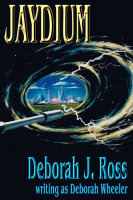
what it means to be human.
I think we Homo
sapiens have been discussing what being human is and means since we
developed abstract language and probably before that. At first, the driving
motivation was undoubtedly how to tell what is us and not-us. This is
certainly a biological imperative at the cellular level; our immune systems
must tackle the question every day, attacking foreign substances like viruses,
bacteria, and allergenic proteins, and it’s also why cancer is so insidious
(cells with the right molecular passwords that nonetheless behave like ravening
barbarians). The same distinctions hold true at the level of the individual,
family/clan, and larger, political units. Whether we’re talking about
communities or nations, “us” = “human” = friendly, safe, cooperative, reliable,
and “them” = “something else” = dangerous, untrustworthy, competitors for
limited resources. In this way, “human” tends to be exclusionary and frictions tend to narrow the scope even further.
In science fiction and fantasy, however, we tend to use the
term in a inclusionary way. Often the
words “human” and “person” are interchangeable. Sf/f writers and readers
pioneered the suggestions that all sapient races think of themselves as people
and therefore, “human,” whatever the biological differences from Homo sapiens. I had a lot of fun with a
race of giant slugs in Jaydium, who
insisted that mammals were incapable of “personness.” The television series Star Trek often portrayed what
Earth-humans and alien-humans have in common, rather than their unbridgeable
differences. (The similarities were undoubtedly caused in part by the
relatively primitive makeup and special effects, leading to the joke about
aliens being actors with funny foreheads.) The creators of the series also
exploited the romantic appeal of the exotic to generate love stories between
members of different species, a phenomenon highly unlikely to occur in nature
but one that had the effect of demonstrating the shared values of sapient
beings. This is an example of broadening
of the use of “human” as a term to include any beings of similar intelligence
and culture that we can understand and sympathize with.
The inversion of the broadening effect comes up most
commonly in horror: beings that look
and sound human but which lack some
trait or motivation we consider so important as to be a necessary part of the
definition of human: empathy, for example, or the capacity for love. A prime
example of this is the vampire, who “walks among us” as if human but differs in
his essential nature. The horrific aspect arises in part from his blood thirst,
but even more from the betrayal of the assumption of shared humanity.
None of this addresses the question of what it is it we feel
defines human as opposed to intelligent-animal, a question not restricted to
writers of speculative fiction. We can look at the biological characteristics
of Homo sapiens, such as opposable
thumbs or a greatly developed prefrontal cortex (the region responsible for
complex moral judgments and control of social behavior, among other things). We
can look at behavioral traits like language, prolonged rearing of young and
care for the aged, the use of fire and cooking, tool-making, and the like. But in
this larger universe we live in, is it wise to judge another entity as human or
nonhuman based solely on what they look like or how they act? Is a child born
with crippling, distorting defects or an adult with a deforming disease not
still human? What about a person who has suffered a debilitating stroke and can
no longer communicate? These and many other, similar questions highlight the
difficulty of defining human by observable
characteristics.
Instead, we can look to experiential
qualities: the capacity for love, for wonder, for kindness; the awareness of
personal mortality and the “binding” of time through personal and generational
transmission of memory; abstract thought, and so forth. It may well be that
animals have some of these abilities but lack the means (or perhaps the
inclination!) to communicate them to us. We know, for example, that many
species exhibit behavior we interpret as grief, loyalty, and self-sacrifice.
Certainly, cooperation is not limited to Homo
sapiens, and tool-usage definitely is not. So instead of emphasizing how
we are different from other creatures in our world, we can focus instead on how
wonderful it is that the things we value in ourselves are not exclusive to our species. Or, contrariwise, that humanity is
not limited to humans.
Jaydium cover:
http://bookviewcafe.com/bookstore/wp-content/uploads/2012/04/Ross-jaydium133x200.jpg

Published on November 03, 2013 01:00
October 23, 2013
Audiobooks!

Jaydium is now available as an unabridged audiobook, narrated by Molly Elston.
Amazon.com
Audible.com
The audiobook version of Northlight will be released November 4, 2013.
Azkhantian Tales is in the works.

Published on October 23, 2013 14:43
The Writing Life: Re-entry and Changing Gears

For the last seven weeks, I’ve been away from home, helping
to take care of my best friend and her family during the end of her life. I had
no idea how hard it would be, but we did well by her and her passing was
peaceful, attended by great tenderness and forgiveness. I stayed on for another
ten days to organize the memorial and transition for her family.
During this entire time, one of my personal anchors was
writing. I loaded up my netbook with current projects and took the folders with
checklists for various Book View Café projects I was working on. In this way, I
created a portable office, albeit one that lacked all the resources I had at
home. For example, although I had access to the internet through my carrier’s
website, I didn’t have my address book files. I learned to “work around” these
limitations, focusing instead on what I could do, delegating and asking for
help with things I couldn’t, and postponing other tasks. As a result, I was
productive with some projects but “on hold” in others.
Now I’m back in my own office, resources at hand. I’m facing
a dual challenge: coming “up to speed” and getting back into balance. What do I
mean by balance? I mean reapportioning (or rather, un-deapportioning) my time
and focus. Rarely have I been so aware of the many activities involved in my
life as a writer. These include, to name a few, original fiction writing
(drafting, revision, revision-to-editorial-request), other aspects of book
production (proofreading); editing anthologies; beta-reading and editing books,
often for other Book View Café members; writing blog posts like this one;
keeping up with professional communications (reading and responding to email
from fellow writers, fans, and editors, not to mention news of the publishing
world).
Back in 1991, I lived in Lyons, France, for the better part
of a year, and I faced a similar changing-of-the-gears. Then I didn’t have
internet/email access, but I did have a portable computer and printer. I’d been
used to writing in short, intense bursts because my children were school-aged.
Once both of them settled into French schools (the younger went from a few
hours of American preschool a week to four full days of école maternelle). Faced with much longer stretches of work time, I
learned how to change from “sprint writing” to “marathon writing.” (I wrote Northlight during that time.) And when I
returned, I had to flip back to shorter periods of time.
Now one of my challenges is how to resume those activities
that were either curtailed or not possible while I was away from home, and keep
the momentum of the things I was able to do, notably complete (most of the
second half of a first draft of a new novel)? I don’t want to devote all my
energies towards “catch-up” and risk losing that wonderful surge when the parts
of a novel come together.
This is where the twin concepts of small steps and balance
come in. I’m transitioning from a time of limited resources and skewed focus to
one that has many more choices and demands. I may end up with the same mix that
I had before I left, but I do myself a disservice if that is what I expect. That time in France taught me
how to “dive deep” into long stretches of work. Other gifts may lie in store for
me from this sojourn . . . but only if I give them room.
By small steps, I mean putting things in order of priority.
Are there hard deadlines? Can I break down an activity into smaller daily
goals? How do I carve out time to finish that novel, keeping in mind that if I
intend to get any sleep (let alone spend time with my husband), I need to put
limits on how much time I devote, at least until the deferred tasks are
completed?
By balance, I mean making sure that I don’t overwork in any
one area. I need a mix of creative work (drafting), of critical work (revising
and editing), of correspondence and the like. And also of play. Play allows me to recharge my energy and to stay in touch
with what my own needs are. Changing gears is hard work. Just because I know
how to do all these things and have done them for some time (in my case,
decades) does not mean I can start and stop effortlessly. I need to make
allowance for the energy it takes to change speed, either from a dead halt or
going faster or slower or in a different direction. In physics, we call this
acceleration. Re-entry definitely falls under the category of acceleration.
Balance allows me to dance through the acceleration phase, my best chance of
avoiding crisis-mode emergencies or burn-out.
One breath at a time, one paragraph at a time. I’m reminded
how important it is to be gentle with myself, to mix liberal quantities of fun
with work, and to give the process time.

Published on October 23, 2013 11:16



